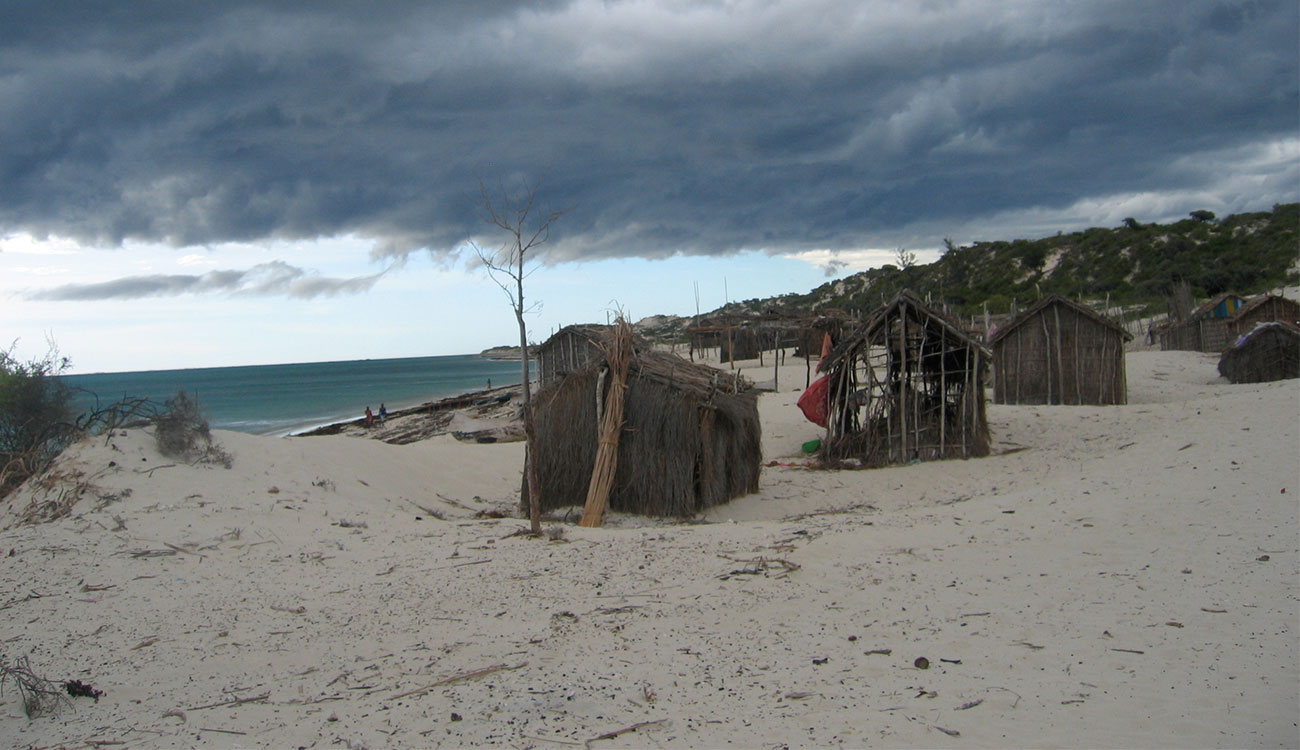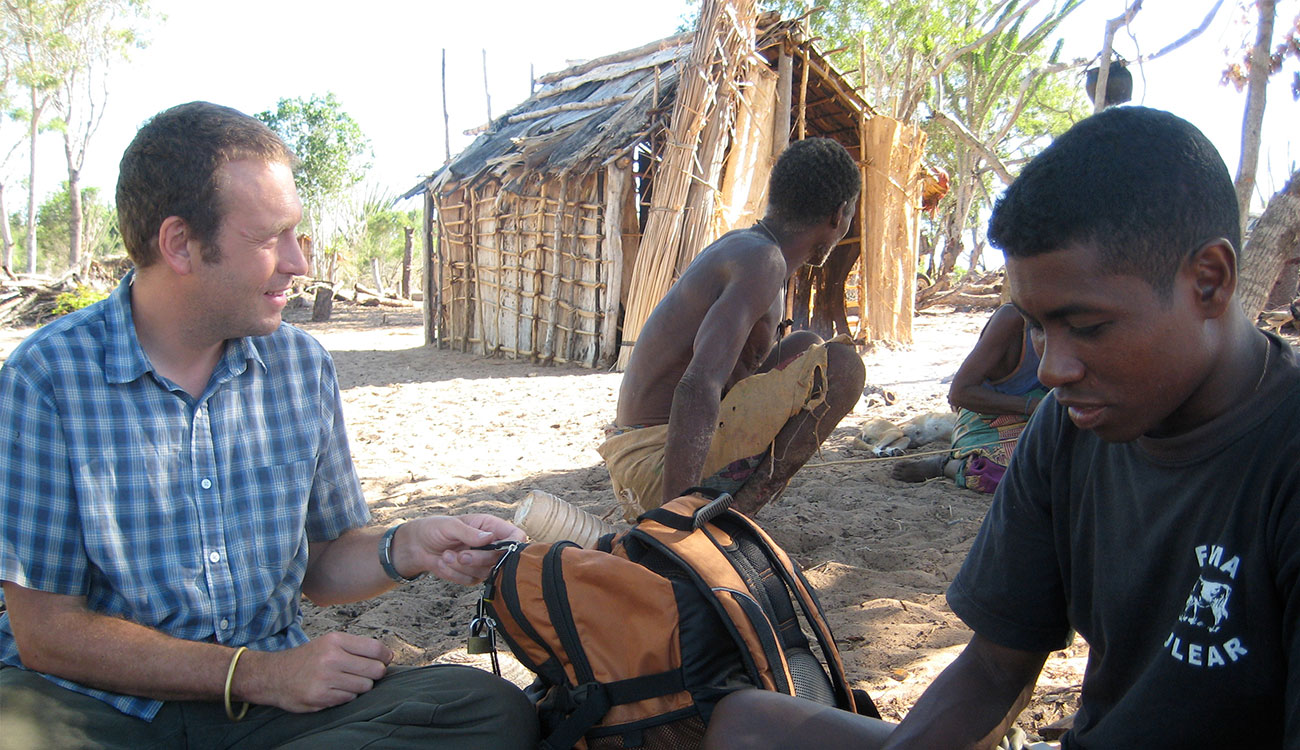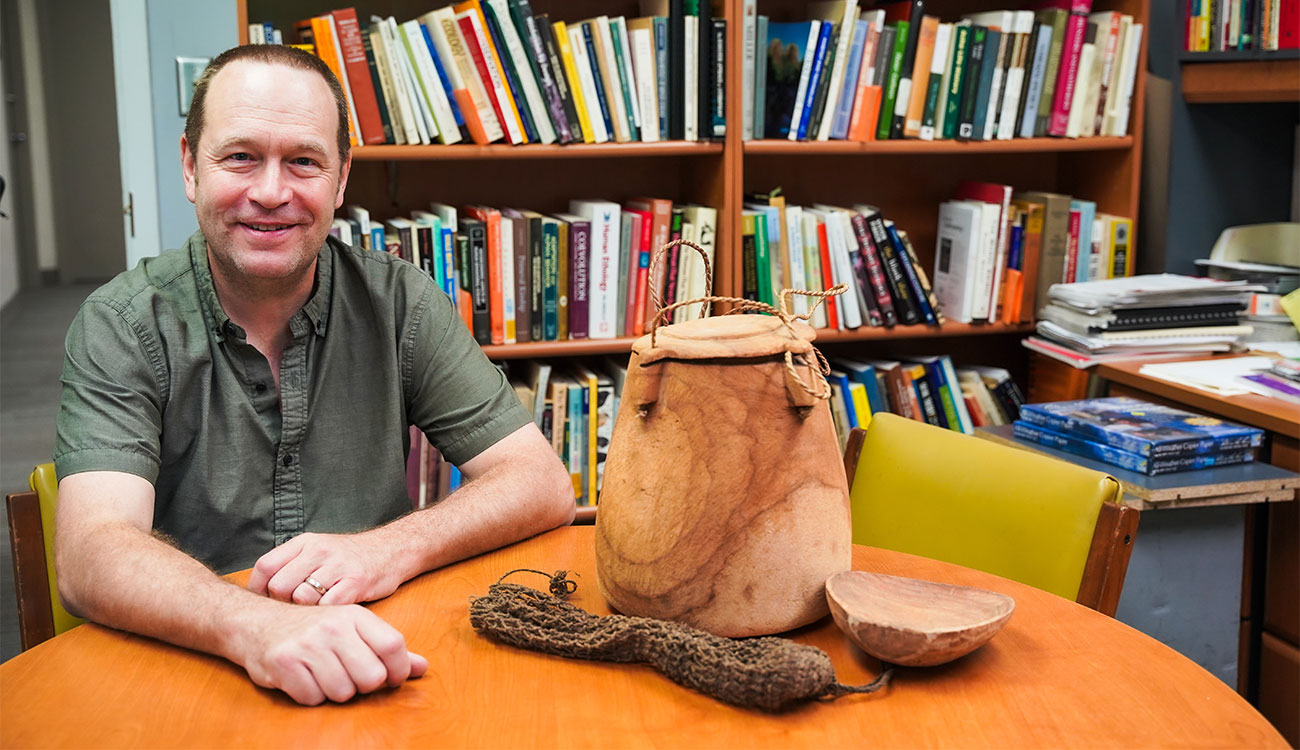Bram Tucker is an associate professor in the University of Georgia’s Department of Anthropology, where his Behavioral Ecology and Economic Decisions Lab studies how people make decisions under risks, vulnerabilities and changes.
He works primarily with Mikea hunter-gatherers, Masikoro farmers and Vezo fishers in southwestern Madagascar, and previously served as president of the Society for Economic Anthropology with the American Anthropological Association. Recently, he completed a five-year NSF-funded project in Madagascar that included over 3,000 interviews and concluded with an academic conference at his partner institution, the Université de Toliara in Madagascar.
Tucker spoke with the Office of Research about his path to studying cultural anthropology, what exactly cultural anthropology is and how one might pursue a similar path for themselves.
Research Communications: Can you share a bit about your background?
Bram Tucker: I grew up in the very boring suburbs of Ohio and Georgia. I always knew that the world was more than I could see around me. I mean, the world must be more interesting than all the boring things that were present in my very limited world. When I was 11, there was a community pottery studio down the street from us in Columbus, Georgia. The guy who ran it, his name was Mr. Dodson, was really interested in Native American pottery from archeological settings. We went to Cartersville, Georgia, to the Etowah Indian Mounds. I remember that was the day I realized, wow, this is right here, where I live in Georgia—ancient cultures and people who lived on this very land in ways that are very different from today. And pyramids! I remember that moment when I wanted to become an anthropologist.
Can you tell us what anthropologists do, and specifically what cultural anthropologists do?
A big part of what any anthropologist does is imagine. Many anthropologists are also science fiction and fantasy fans. There’s a similar skill of trying to imagine different worlds or ways of living. For cultural anthropology, we’re lucky because we can go and visit those places, meet people and talk to them.
The real significance of anthropology is that there are many ways to live and many kinds of people, and their stories aren’t known by us. If anthropologists don’t go and learn about people different from those around us, the urban world just makes up stories about them—most of which are totally false. Like, they are primitive or backward people, or that we’re more advanced. Those are fanciful ideas that don’t give credit to people. So, the job of a cultural anthropologist is to learn how people really live. What are people thinking about? How do they understand the world that’s very different from the way we do? We explore that difference.
What does your research focus on?
I am what one might call an economic anthropologist. My original training was in evolutionary behavioral anthropology. But, largely, I am interested in how rural people who live outside of urban areas—people who live in what we sometimes call the developing world or the underdeveloped world or the third world or the global south, people who actually have to get food from the environment—how do they make their decisions and how do they make their livelihoods? Initially, I wanted to work with hunter-gatherer people. Since then, I’ve started to work with our neighbors as well, farmers and fishermen. So, I do a lot of stuff that’s a comparison of economic decisions and ways of thinking between those three ways of making a living.

How does your research help further our understanding of human culture?
I hope it does. If you take an economics class here on campus—and I’m not knocking economics, I really like economics—you might learn that economics is capitalism, that other forms of economy are not quite as mature as capitalism or they are capitalism in disguise. But what my research has explored is how people in Madagascar value the things that they produce, buy and sell. My recent research has explored the deep meanings of cultural differences in making economic decisions. In Madagascar, it is about beliefs, ontologies and concepts of how the world works, which deeply involve ancestors.
There, ancestors are everything. They give life meaning. The purpose of being alive is to serve your ancestors, to continue what they started centuries or millennia ago. Ancestors are always watching and judging you, and you can’t always know what they’re judging you for. There’s some mystery to it all. So, a lot of the choices about what crops you grow, what prey you hunt or gather, or what you sell in the market involve trying not to anger the ancestors. This is the kind of thing that economists often miss if you’re just looking at things like marginal utility. I don’t think economists deny that those things are out there, but that’s not their focus. This is what an economic anthropologist can bring.
How do you see biases in doing ethnographic research? How do you overcome your own biases?
Our biases are always there. Earlier, I was looking for the right word about the developing world. I like to say that it’s like the Eiffel Tower in Paris. If you’re in Paris, the Eiffel Tower is always there. It’s always looming over you. But a lot of what you do has nothing to do with the Eiffel Tower. Bias is always there, but it’s not everything.
I do really believe in science as a tool for learning. I do believe in the value of scientific, intellectual devices like having a large, statistically representative sample. To me, those are ways to ground truth and control bias. If I hear one remarkable story of ancestors haunting somebody because they made the wrong economic decision, I might think that that’s a very common occurrence. But you don’t know unless you ask a large, statistically representative sample of people.
How do you see the debate of anthropology as science versus anthropology as humanity?
I was in graduate school in the 1990s, which was a time we think of as the “science wars” in anthropology when science was questioned for its practice and power. It divided the world of anthropology. It was an incredibly valuable debate about the limits of science. Among these limits, we often invent things as concepts in our heads and then assume they’re real. If we talk about social capital enough, we start to think that social capital is a thing you can see. But at a deeper level, we don’t know if my social capital and yours are the same thing.
What we learned is that we need to take a critical look at why we think things. Why do we assume that humans throughout the world are naturally divided into tribes or ethnicities that govern themselves, that have chiefs or other people who govern them, as anthropologists used to assume? Turns out, these concepts are grounded in a colonial way of looking at the world that we need to question.
Science itself can be very limited if we don’t do the deep experiential feeling, learning, being, exploring and documenting that a humanities side of anthropology brings. At this point, we need to get beyond divides between science and humanities and realize that they’re both extremely valuable.

What’s your current research focus?
I’m in the process of wrapping up a large project about culture and economic decisions. One of the things I’m excited about data that looks at how people understand causality, basic cause and effect. We asked a sample of people what causes the rain to fall. This part of Madagascar is very dry, and rain is extremely unpredictable. So how do people make sense of this? You can say that it’s just random, but randomness is a very agnostic way of trying to explain causality. Randomness says there’s no reason for it. It just happens or doesn’t happen. What I found in Madagascar is that people have random, natural, supernatural and social understandings of causality, just as we do.
None of these ways of thinking about the world are primitive. None of these ways of thinking about the world are wrong. Nor should they be unfamiliar to us, because we do all of these things.
Do you have any advice for young learners who want to become cultural anthropologists?
Do it. No matter what opportunity you get to travel, to open yourself up to people, take it. The act of doing cultural anthropology is often an act of talking to people. It takes energy to talk to people. Many of us find it very difficult. But I’ll tell you, it’s fun to try to break through the barrier of talking to strangers. Get to know people. Take them seriously as people. There’s a great line from a “Doctor Who” episode, that “all people are bigger on the inside than on the outside.” And that’s so true. If you want to be a cultural anthropologist, never forget that all people are bigger on the inside than on the outside. And any opportunity you get to travel and meet people, take it. That’s how you become a cultural anthropologist.
VIDEO: Watch the full interview with Bram Tucker on YouTube.






